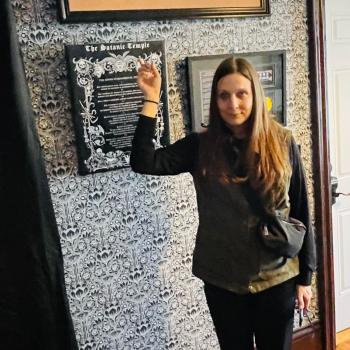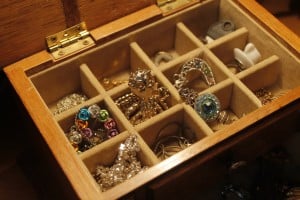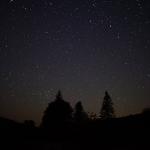Name: Cosette
Location: Miami, FL
Website/Blogspot: http://unhub.com/cosette
Social Networking Site: http://twitter.com/byjupiter
How long have you been a Wiccan? What branch of Wicca do you practice?
I’ve been identifying as Wiccan since about 1995 while I was still in high school. I was largely a self-taught solitary, but I attended public circles and had a few Pagan friends. In 2007, I was initiated into the Georgian Wicca tradition.
What drew you to Georgian Wicca? How is it different than Gardnerian Wicca?
Although the coven I belong to is pretty eclectic and egalitarian, the founders are Georgian and were open to training interested members of the coven. The Georgian trad is an excellent fit for me because it has a traditional foundation, but is very much a living tradition. It’s flexible and full of colorful people.
Georgian Wicca is an initiatory, oath-bound tradition with a degree system and is similar to Gardnerian Wicca and its close relatives, but perhaps the most significant difference is that the Georgian tradition doesn’t trace its initiatory line to one of the old English covens. It was founded by George Patterson in 1970 in the United States.
How has Wicca changed you? How much of you stayed the same?
Paganism in general gave me a different way of understanding deity and a holistic approach to the world. Thinking of the world as a web where everything is interconnected shifts the way we treat our environment and each other. It has fed my interest in environmental issues and social justice. For me, Paganism is earthy and social, about community, honoring the gods, spirits of the land, and our ancestors. It’s about those connections. Wicca is more internal for me and one important aspect of it is magick as a vehicle for self-improvement and personal growth. Change is the only constant, as they say, and those themes dominate my Craft and my life.
Tell us about yourself? Your upbringing?
I was born in Havana, Cuba and came to the U.S. with my family in 1980 during the Mariel boatlift. My family settled in Miami. I grew up in a conservative Roman Catholic home, but it was mostly rooted in cultural tradition. My family’s Catholicism is personal; they’re not church-goers. I was baptized when I was six years old and received my First Communion when I was 10. Then I told my parents I didn’t want to continue and they were fine with that.
When I was about 11, I discovered a book on Greek mythology and that put me firmly on the pagan path. That same year, I begged my mother to buy me the Parker Brothers Ouija and I was delighted to unwrap it Christmas morning much to the horror of other adults in the room who said it was dangerous and possibly demonic. I laugh when I recall that day. My mom also bought me my first book on Wicca when I was 14. It was a used copy of Buckland’s blue book that I found at a local thrift store. In high school, I befriended my hippy, feminist teachers who talked about “the goddess”, took me drum circles on the beach during the full moon, and viewed witchcraft as a woman’s birthright. One of them gave me my first tarot deck. My dad has helped me drill holes in Yule logs for candles and glue pine cones to sticks to create a thyrsus. I’m very fortunate that the adults in my life have allowed me to cultivate my interest in Paganism.
I understand some misconceptions that is out there is that if you’re born in certain countries and identify yourself as Pagan/Wiccan there is a “shellshock”, shall I place “nicely”, that you’re not an adherent of one’s country “folk religion”. In your case, it would be the affiliation of Cuba with Santeria/Yoruba based religion. How do you address the misconceptions?
It may seem odd that I’ve adopted Wicca, the only religion England gave the world, as Hutton says, as my faith. If I were still living in Cuba, I might be a santera; who knows. But, as an American, I feel just as much an heir to America’s British cultural and political heritage that has been influenced by other European cultures as well as the classical world. It’s not that far from me ancestrally either. Cuba was colonized by Spain, which people seem to forget is also in Europe and has seen many different cultures and rulerships in its history including the Iberians, Celts, Greeks, and Romans.
There are other reasons I reject the idea that a person should adhere to their so-called ethnic religion. For starters, there is the problem of defining what ethnicity is. What if you were adopted and just don’t know very much about your ancestral heritage? What if you’re living far from your place of origins and don’t feel any connection to it? What if you have fundamental theological disagreements with the religion of your ancestors? What if you just feel called to something else?
Are there any elements of Santeria you take with you into your current practices? What are they?
Over recent years, I have slowly been exploring Santeria. Through its divination system, it was determined that Ogun is my patron orisha and I have received the Warriors. Working with them has become a standard part of my Pagan practice. I’ve learned a lot about working with ancestors and I love the music and dance of Santeria.
I don’t really blend Santeria and Wicca, but there are some Santeria elements that I would introduce to future students or coven, such as working with ancestors, mediumship, trance, possession, and celebrating initiation annually.
In the Latino community is there a misconception of Paganism/Wicca that you would like to address? Within the pagan community as a whole?
In South Florida, there are many Hispanic Pagans; Hispanics are not really a minority here, but my guess is that most Hispanics are completely unfamiliar with contemporary American Paganism. There is a rise in Evangelicals, but the Hispanic spiritual landscape includes the worship of saints, Mariolatry, indigenous traditions, brujeria, Spiritism, and the African-originated religions like Lukumi, Ifa, and Candomble, so I think Hispanics could understand Paganism easily enough.
I’m not sure what misconceptions Pagans carry about Hispanics other than those that run through the over culture already — that we’re all the same (brown and Mexican, apparently), that we’re all poor and uneducated “illegals” popping out babies, abusing welfare, and avoiding taxes. But I’ve never been at the receiving end of racial hostility from a fellow Pagan. That I’m Hispanic is either unnoticed or a non-issue. There was only one time where I remember feeling uncomfortable. It was during a workshop at PatheaCon 2010 and I was asked to identify myself as an immigrant. I went from being white to other in about 10 seconds.
I understand we mentioned Santeria; yet many Afro-Caribbean/Latin America “folk religion” also blends Christianity. In my case, my mother is Roman Catholic with no Vodou affiliation. So, I grew up with a Roman Catholic Christian background by my maternal side; while my paternal side is Vodou, yet my father is very eclectic. Therefore, I understand just because you do blend Santeria in your current practices doesn’t necessarily equate that your prior religious background is Santeria (just needed to clarify this for our readers); what was your religious background prior to Wicca?
That’s right; Santeria is a syncretic system that merges Yoruba religion with Roman Catholicism and some indigenous traditions. Spiritism is also an important element of it. Cuba is a traditionally Catholic country, but in some instances Catholicism is modified or influenced with Santeria and it is not uncommon for a person who practices Santeria to identify as Catholic.
My parents are Catholic, but generally only go to church for sacramental rituals such as baptisms or matrimony. After the communist revolution of 1959, religious practice in Cuba was restricted so perhaps that’s why they’re not such avid practitioners. My mother has vaguely mentioned having gone to a drumming ceremonies as a child, but Santeria was not part of my upbringing at all. My parents don’t know much about it, but I’ve noticed that certain things that they think are Catholic are actually Santeria practices.
I don’t recall ever identifying as Catholic. So much of it just didn’t make sense to me and, even as a child; I rejected its doctrinal theology dealing with salvation through Jesus Christ. Life seemed pretty good when I was 10 and it was hard to be preoccupied with ideas of sin. As I grew older and more cognizant of social issues, I rejected the church’s position on sexuality and gender issues. I don’t’ think of myself as ever having been anything but pagan.
What inspired you to create your blog?
I love technology and I began blogging with AOL Journals because I wanted to see what it was all about. I was hooked right away. I loved the sharing of information and how communities grew around blogging. I hardly remember that first blog now, but I do remember one entry where, in response to one of John Scalzi’s blogging challenges, I created a little paper man with his face and took him out on a day of witchy adventures where he was initiated via the Great Rite with Barbie, but ultimately sacrificed for angering my coven mate’s cat. I moved to Blogger in March 2006 as part of an exodus when AOL began running ads on journals and censoring content. I just blog about the things that interest me.
What type of audience do you feel would benefit from your blog?
I blog and share Pagan news through the Pagan Newswire Collective and I also manage the blog for Cherry Hill Seminary so maybe it’s ironic that I don’t have specific goals for my own blog or a particular audience in mind. I blog about Paganism from primarily a Wiccan perspective, share my thoughts about various issues, and use the blog to explore and process. I think anyone interested in Wicca or in seeing what a Wiccan is like could benefit from my blog.
What deity (deities), if any, do you work with?
I work with Ogun a lot. Ogun is my rock. He clears the path for me, inspires me, and guards me as I walk it. I have tremendous love for Ogun. Recently, I realized that Yemaya has also been a constant force in my life and I feel I owe her a great deal. Brigid entered my life when I joined my coven. She has a permanent place on my altar.
What advice would you give to “new” Wiccans of color? Wiccans/Pagans who are interested in “Eurocentric”/ “modern Paganism” path; yet may feel conflicted with “abandoning” their “native folk religion” path?
Give yourself permission. It’s worth reflecting on what folk religion is, why it might not call to you, and what draws you to European paganism, but there is a lot of misinformation and, quite frankly, a lot of nonsense about ethnicity surrounding Paganism and society in general. Humans have been traveling the world for 100,000 years now, intermixing, and adopting and syncretizing each other’s cultural and religious beliefs and practices. I don’t see any reason to stop now.
Are you a pagan and/or Wiccan of color? African traditionalist, regardless of ethnicity? Email nouvellenoirgoddess@gmail.com if you’d like to be featured in DOE Q&A.
















